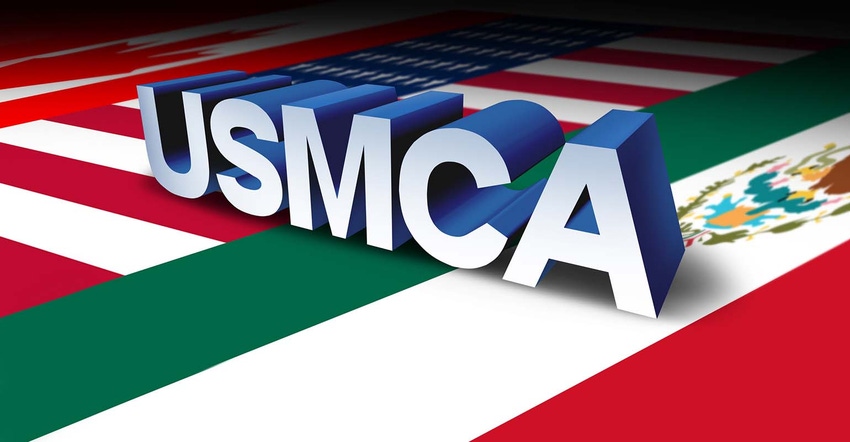Another strong, bipartisan vote achieved in Senate, with 89 senators supporting new trade pact.

In a vote Thursday morning, the full Senate advanced the U.S.-Mexico-Canada Agreement (USMCA) by a vote of 89-10. The passage ends what has been more than a year-long process since the renegotiated North American Free Trade Agreement (NAFTA) was initially signed by the three countries. President Donald Trump is expected to sign the trade pact next week, and Canada is expected to convene to pass the bill later in January.
Those who opposed the final passage include Sens. Kristen Gillibrand (D., N.Y.), Kamala Harris (D., Cal.), Harry Reid (D., N.V.), Pat Toomey (R., Pa.), Bernie Sanders (I., Vt.), Brian Schatz (D., Hawaii), Sheldon Whitehouse (D., R.I.), Ed Markey (D., Mass.) and Cory Booker (D., N.J.).
“We’ve long waited for this day, and now USMCA will finally head to the President’s desk,” Agriculture Secretary Sonny Perdue said. “The passage of USMCA is great news for America’s farmers and ranchers. With congressional consideration now complete, our farmers and ranchers are eager to see the President sign this legislation and begin reaping the benefits of this critical agreement."
USMCA preserves critical, duty-free access to Mexico and Canada, Senate Finance Committee chairman Chuck Grassley (R., Iowa) explained while speaking on the floor Wednesday evening.
“For the first time ever, U.S. eggs and dairy exports will be sold in Canada. This is very good news. It means an additional $227 million for dairy exports to Canada and $50.6 million into Mexico. … USMCA will increase U.S. exports of poultry and eggs to Canada by $207 million. It also addresses restrictions that kept U.S. wheat and wine out of Canada,” Grassley said.
Grassley noted that, according to the U.S. International Trade Commission, USMCA will raise real gross domestic product by more than $68 billion and create nearly 176,000 jobs. “All told, the trade pact is forecast to boost farm and food exports by at least $2.2 billion. Considering the slump in the farm economy, it’s really shameful that passage of the USMCA was stalled for over a year – and nearly derailed – by a partisan agenda, including impeaching this President,” Grassley said in comments on the Senate floor.
The agreement will provide new market access for American dairy and poultry products while preserving the zero-tariff platform on all other agricultural products. In particular, the agreement gives U.S. dairy products access to an additional 3.6% of Canada’s dairy market – even better than what was proposed in the Trans-Pacific Partnership trade agreement.
U.S. wheat will receive fairer treatment thanks to Canada’s agreement to grade U.S. wheat no less favorably than its own. Mexico and the U.S. have also agreed that all grading standards for agricultural products will be non-discriminatory.
Additional provisions enhance science-based trading standards among the three nations as the basis for sanitary and phytosanitary measures for agricultural products as well as make progress in the area of geographic indications.
The agreement further includes measures that address cooperation, information sharing and other trade rules among the three nations related to agricultural biotechnology and gene editing.
Canada’s Parliament doesn’t convene until Jan. 27, and implementing legislation still needs to be sent to Canada’s House and Senate. After that, there must be three readings in the House before it goes to the Senate. As a reference, it took Canada 28 sitting days (the days Parliament is in session) to pass the Comprehensive & Progressive Agreement for Trans-Pacific Partnership, and that was with a majority government, making it difficult to predict Canada's timing for completing the process.
Under the text of the agreement, “Each party shall notify the other parties in writing once it has completed the internal procedures required for the entry into force of this agreement. This agreement enters into force on the first day of the third month following the last notification.” Therefore, if Canada and the U.S. pass USMCA by the spring, the earliest the deal could enter into force would be the summer of 2020.
About the Author(s)
You May Also Like




.png?width=300&auto=webp&quality=80&disable=upscale)
